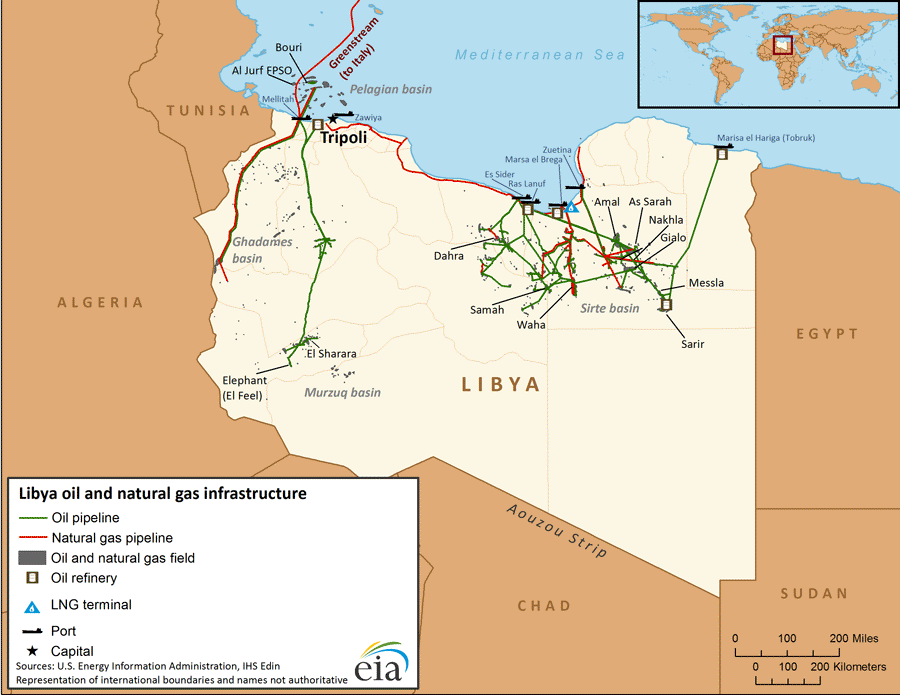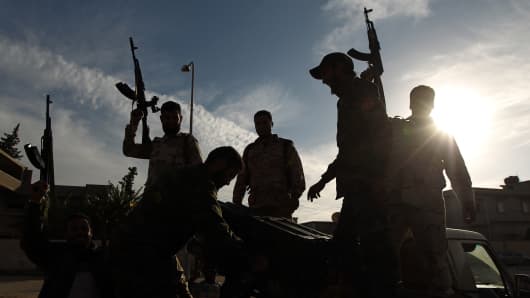Libya's eastern military leader has ordered his
forces to march on Tripoli, sparking concerns that open war could soon
break out between the main political factions in a key oil-producing
nation.
The OPEC member state has been riven by
conflict since the fall of dictator Muammar Qaddafi in 2011. For much
of that time, General Khalifa Haftar has held the country's east,
drawing support from Egypt and the United Arab Emirates and serving as a
foil to the United Nations-recognized government in the capital of
Tripoli.
The two sides have been
engaged in UN-sponsored power-sharing talks. But on Wednesday, Haftar's
Libyan National Army unexpectedly advanced towards Tripoli. Skirmishes
between the LNA and forces loyal to Prime Minister Fayez al-Serraj have
since been reported.
Earlier, it remained unclear
whether Haftar intended to bring the west under his grip or merely
increase his leverage ahead of a national conference later this month.
UN Secretary-General Antonio Guterres, who is in Libya to meet with
leaders, called for calm and restraint.
But the order to enter
Tripoli came in the early evening in Libya in a voice recording from
Haftar posted online, the Associated Press reported. The general told
his troops only to raise their weapons "in the face of those who seek
injustice and prefer confrontation and fighting," according to AP.
"Those who lay down their weapons are safe, and those who raise the white banner are safe," he said.
This year, Haftar's LNA
forces have already sought to bring order to the restive southern
oil-producing region. But a campaign to take Tripoli could be even more
grueling, says Hamish Kinnear, senior analyst for the Middle East and
North Africa at Verisk Maplecroft.
"Our base case is that
the LNA will soon find itself bogged down in heavy fighting near
Tripoli," Kinnear said in an email briefing. "Unlike its recent advance
in the south, the LNA will face more determined resistance from larger
and better organised militias in the western region."
The LNA's strategy of
bringing the south's small, opportunistic militias under its umbrella
through negotiation and bribes would not be effective in the east,
Kinnear says. Despite controlling oil terminals, Haftar's forces would
also struggle to finance a prolonged conflict because his eastern
faction does not hold sway over Libya's National Oil Corporation and the
central bank, he added.

The advance of Haftar's
LNA answers the "million dollar question" Libya watchers have been
asking for years, says Helima Croft, global head of commodity strategy
at RBC Capital Markets. Will Haftar finally seek to consolidate control
over Libya's northern coast, leaving the nation's eastern oil terminals
vulnerable to his rivals?
"Certainly, if he's going
to take control of Tripoli by force, the question is what does that
mean for these sizable energy assets that are under his control in the
east?" Croft said.
The looming conflict
comes at a time when global crude supplies are tightening and oil prices
are steadily advancing towards $70 a barrel. On the demand side, global
consumption is growing faster than many expected. On the supply side,
OPEC and its allies led by Russia are cutting output while the U.S. is
poised to tighten energy sanctions on Iran and Venezuela.
Analysts and traders keep
a close eye on Libya because its oil production has been one of the
biggest wild cards in the oil market in recent years. Its output has
fluctuated wildly as the nation's southern oil fields have frequently
gone offline amid fighting among Libya's patchwork of militias and
tribal and ethnic groups. Haftar also briefly lost control of the Ras
Lanuf and Sidra oil terminals last year.
If Haftar takes control
of the west, it could be negative for oil prices because consolidated
leadership could allow more crude to flow to the market from Libya, says
Croft.
However, Croft cautions
that it would be difficult for any leader to impose order across the
fractious country, and a battle in Tripoli could be a prelude to
prolonged fighting. Holding Tripoli, the east and the south could
stretch the LNA's capacity to the breaking point.
"The problem with the
south is it's like the Wild West down there," she said. "There are so
many competing militias down there. You have a community that feels so
marginalized, that is heavily armed."
"To me, that's a powder keg."

We CLOSED JOINT-STOCK COMPANY AGS OIL is one of the leading Oil & Gas trading companies in Russia Federation with good business reputation and well experienced in the Petroleum and mining sector. We offer the following trades through our reliable Refineries: D2 DIESEL OIL GOST 305-82, JP54 AVIATION KEROSENE COLONIAL GRADE, UREA 46%/PRILLS, LNG, LPG, REBCO, MAZUT100 GOST 10585-75/99, AUTOMOTIVE GAS OIL(AGO). We as well secure allocations from our various Refineries for our numerous buyers who are interested in Spot transactions on FOB/CIF deliveries to any world safe port (AWSP). Our Refineries have their products both at Russian ports and Rotterdam port. we also have a reliable SHIPPING COMPANY if you are in need of find the contact bellow.
ReplyDeleteEmail: baevsergeyalexandrovich@bk.ru
BAEVSERGEY ALEXANDROVICH.